Bob Reddy – Florida Catholic
6/18/19
There are moments in the life of each Parish that are well remembered: the dedication of a new building, significant anniversaries, and of course, the installation of a new Pastor.
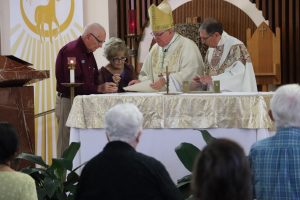 For the faithful of St. James Parish in Lake Placid, such a day occurred June 2, the Feast of the Ascension of the Lord, when Father Vincent Clemente was installed as Pastor by Bishop Frank J. Dewane.
For the faithful of St. James Parish in Lake Placid, such a day occurred June 2, the Feast of the Ascension of the Lord, when Father Vincent Clemente was installed as Pastor by Bishop Frank J. Dewane.
The Ascension was an appropriate time to install and Pastor, because it was when Jesus commissioned the Apostles to go out into the world and spread the Gospel. The Church, in creating its structure, has established Parishes to help orchestrate that effort. The leader of a Parish is appropriately a Pastor who will give the impetus to the faithful to go forward out into the world to live the Gospel by spreading the Good News through their words and actions.
Bishop Dewane encouraged the faithful to offer advice to their new Pastor but also know that he will be called to make difficult decisions that not everyone will appreciate. “He needs your support through prayer and the gifts of the Holy Spirit. Let the decisions that are to be made become a part of who you become as a Parish community.”
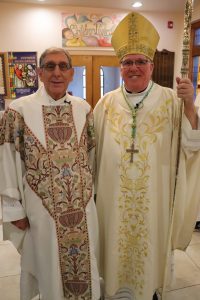 During the installation, the priest begins with selected words leading to the start of the Creed when he is then joined by the faithful. At the end of the Creed, the new Pastor has extra lines which are exclusive for him. In addition, the Pastor makes an Oath of Fidelity to the Bishop and his successors; formalized by his placing his hand upon the Book of Gospels.
During the installation, the priest begins with selected words leading to the start of the Creed when he is then joined by the faithful. At the end of the Creed, the new Pastor has extra lines which are exclusive for him. In addition, the Pastor makes an Oath of Fidelity to the Bishop and his successors; formalized by his placing his hand upon the Book of Gospels.
Following the installation, two members of the parish, representing the entire congregation, served as witnesses and signed the formal documents, copies of which are left at the Parish, placed in the Diocesan archives and in the personnel file of Father Clemente. Bishop then introduced the new Pastor to a rousing applause.
Father Clemente thanked Bishop Dewane for his appointment and commented on how hospitable the Parish community has been since the day he was first assigned.
After the installation, a reception was held in the Parish Hall.






 The Catholic Community Foundation Coseglia Scholarship was established in 2012 to fulfill the dreams of Frank and Florence Coseglia. The Coseglias wanted to provide financial support to deserving Catholic high school graduates pursuing degrees at accredited colleges or universities, and they wanted that financial support to last far beyond their lifetimes. For these reasons, the Coseglias chose to create a Catholic Legacy by establishing an endowed scholarship fund with the Catholic Community Foundation of Southwest Florida.
The Catholic Community Foundation Coseglia Scholarship was established in 2012 to fulfill the dreams of Frank and Florence Coseglia. The Coseglias wanted to provide financial support to deserving Catholic high school graduates pursuing degrees at accredited colleges or universities, and they wanted that financial support to last far beyond their lifetimes. For these reasons, the Coseglias chose to create a Catholic Legacy by establishing an endowed scholarship fund with the Catholic Community Foundation of Southwest Florida.
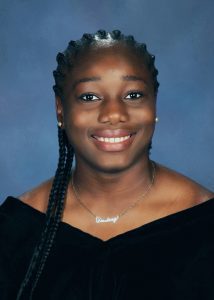
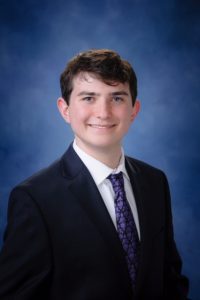
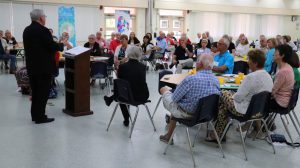 Parish Respect Life Representatives (designated by Pastors), Knights of Columbus Culture of Life Chairmen, Council of Catholic Women Representatives, and others interested in serving, gathered June 2 at St. Charles Borromeo Parish in Port Charlotte. Those gathered enjoyed their time with like-minded people who dedicate themselves to building a Culture of Life in the Diocese of Venice. Some attendees have been volunteering for 30 or more years while others have recently felt called to do something to promote a greater respect for life.
Parish Respect Life Representatives (designated by Pastors), Knights of Columbus Culture of Life Chairmen, Council of Catholic Women Representatives, and others interested in serving, gathered June 2 at St. Charles Borromeo Parish in Port Charlotte. Those gathered enjoyed their time with like-minded people who dedicate themselves to building a Culture of Life in the Diocese of Venice. Some attendees have been volunteering for 30 or more years while others have recently felt called to do something to promote a greater respect for life.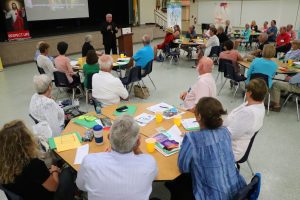 Looking ahead to the coming year, she announced that the movie UNPLANNED is due to be released on DVD and streaming in mid-August, providing a powerful tool for pro-life education. The dates for Catholic Days at the Capitol in Tallahassee were announced: January 28-30, 2020. The three-day bus trip will be earlier since the Florida Legislative Session runs from January to March in even years, allowing legislators more time for campaigning in the summer and fall leading up to the 2020 elections.
Looking ahead to the coming year, she announced that the movie UNPLANNED is due to be released on DVD and streaming in mid-August, providing a powerful tool for pro-life education. The dates for Catholic Days at the Capitol in Tallahassee were announced: January 28-30, 2020. The three-day bus trip will be earlier since the Florida Legislative Session runs from January to March in even years, allowing legislators more time for campaigning in the summer and fall leading up to the 2020 elections.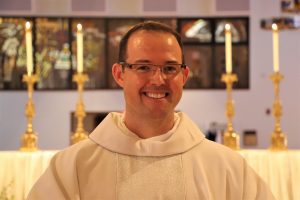 “This is a tremendous honor,” Father Roser said. “The responsibility is awesome, and I will work diligently to help spread the word that promoting a vocation to the priesthood needs the support of all the faithful.”
“This is a tremendous honor,” Father Roser said. “The responsibility is awesome, and I will work diligently to help spread the word that promoting a vocation to the priesthood needs the support of all the faithful.”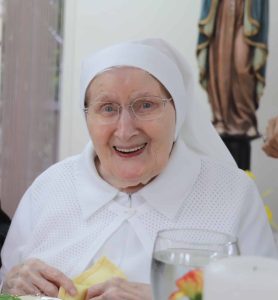
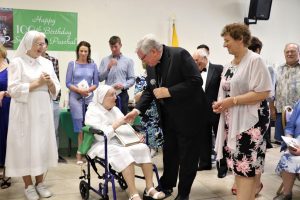 With the Sisters of St. Anne before becoming a Poor Clare, Sister Mary Paschal served the sick and the elderly in this community. During the difficult times of World War II, she transferred to the contemplative life in 1941 when she joined the Poor Clare Nuns at Sclerder Abbey, Cornwall, England. Sister Mary Paschal made her final profession as a Poor Clare on Oct. 4, 1946. She served this community as novice mistress, and abbess. When the monastery of Sclerder closed, Sister transferred to the Monastery of St. Clare in Arundel, England for a short time and then to the Monastery of St. Clare in Darlington, England, before making her final journey to the San Damiano Monastery of St. Clare on Fort Myers Beach.
With the Sisters of St. Anne before becoming a Poor Clare, Sister Mary Paschal served the sick and the elderly in this community. During the difficult times of World War II, she transferred to the contemplative life in 1941 when she joined the Poor Clare Nuns at Sclerder Abbey, Cornwall, England. Sister Mary Paschal made her final profession as a Poor Clare on Oct. 4, 1946. She served this community as novice mistress, and abbess. When the monastery of Sclerder closed, Sister transferred to the Monastery of St. Clare in Arundel, England for a short time and then to the Monastery of St. Clare in Darlington, England, before making her final journey to the San Damiano Monastery of St. Clare on Fort Myers Beach.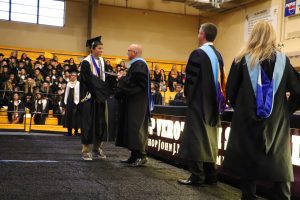 During the final two weeks of May, 330 Diocese of Venice Catholic High School students graduated, moving on in their personal journey, prepared for college, and a life of purpose.
During the final two weeks of May, 330 Diocese of Venice Catholic High School students graduated, moving on in their personal journey, prepared for college, and a life of purpose.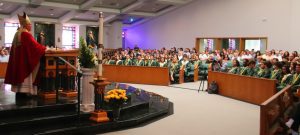 The future engineers, doctors, teachers, priests and leaders of tomorrow received their diplomas from Cardinal Mooney Catholic High School in Sarasota; St. John Neumann Catholic High School in Naples; Bishop Verot Catholic High School in Fort Myers and the Donahue Academy in Ave Maria.
The future engineers, doctors, teachers, priests and leaders of tomorrow received their diplomas from Cardinal Mooney Catholic High School in Sarasota; St. John Neumann Catholic High School in Naples; Bishop Verot Catholic High School in Fort Myers and the Donahue Academy in Ave Maria.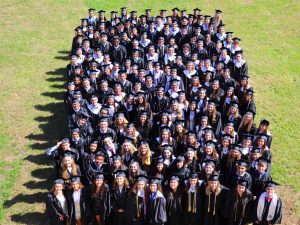 Some 98 percent of the graduates are going on to some of the greatest institutes of high learning across the country. These graduates also earned an impressive $32 million is scholarships and represent some of the best and brightest in Southwest Florida.
Some 98 percent of the graduates are going on to some of the greatest institutes of high learning across the country. These graduates also earned an impressive $32 million is scholarships and represent some of the best and brightest in Southwest Florida.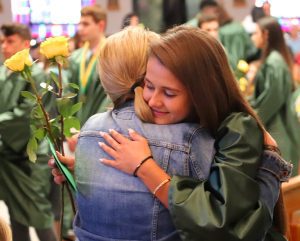 A large percentage of the graduates are going on to study at Catholic colleges and universities, while others will be continuing their studies at Ivy League schools, with one accepting an appointment to the U.S. Air Force Academy. The exceptions are either entering the workforce or military, and two are going on mission trips.
A large percentage of the graduates are going on to study at Catholic colleges and universities, while others will be continuing their studies at Ivy League schools, with one accepting an appointment to the U.S. Air Force Academy. The exceptions are either entering the workforce or military, and two are going on mission trips.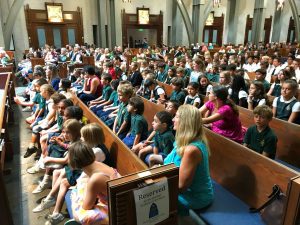 During the May 24 Baccalaureate Mass for Bishop Verot Catholic High School at St. John XXIII Parish in Fort Myers, Bishop Frank J. Dewane commended the graduates for their accomplishment by expressing his confidence that they will reflect the good that the Lord calls forth from them as they go out into the world.
During the May 24 Baccalaureate Mass for Bishop Verot Catholic High School at St. John XXIII Parish in Fort Myers, Bishop Frank J. Dewane commended the graduates for their accomplishment by expressing his confidence that they will reflect the good that the Lord calls forth from them as they go out into the world.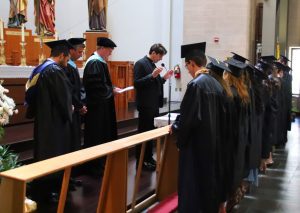 Bishop Dewane also took time to thank the parents for having the confidence to send their children to a Catholic high school knowing that doing so is a sacrifice for them. He also thanked the faculty and staff for their commitment to providing a safe and supportive environment for the students in their charge.
Bishop Dewane also took time to thank the parents for having the confidence to send their children to a Catholic high school knowing that doing so is a sacrifice for them. He also thanked the faculty and staff for their commitment to providing a safe and supportive environment for the students in their charge.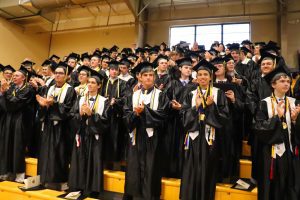 The Bishop Verot graduation was May 25 at the high school. The Baccalaureate Mass for Cardinal Mooney was May 16 at Incarnation Parish and the graduation May 17 at the Van Wezel Performing Arts Center in Sarasota. The St. John Neumann Baccalaureate Mass was May 22 at St. Elizabeth Seton Parish in Naples and the graduation at the high school on May 23. The Donahue Baccalaureate Mass and graduation were both May 31 at Ave Maria Parish.
The Bishop Verot graduation was May 25 at the high school. The Baccalaureate Mass for Cardinal Mooney was May 16 at Incarnation Parish and the graduation May 17 at the Van Wezel Performing Arts Center in Sarasota. The St. John Neumann Baccalaureate Mass was May 22 at St. Elizabeth Seton Parish in Naples and the graduation at the high school on May 23. The Donahue Baccalaureate Mass and graduation were both May 31 at Ave Maria Parish.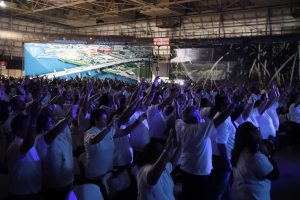 For about 1,000 people a recent Sunday was spent growing and better rooting their love for the Lord while also gaining a profound sense of devotion to the Blessed Sacrament.
For about 1,000 people a recent Sunday was spent growing and better rooting their love for the Lord while also gaining a profound sense of devotion to the Blessed Sacrament.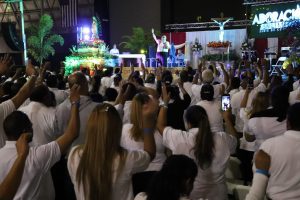 “Beautiful!” “Amazing!” “Powerful” “I felt Christ’s love!” These were just some of the reactions of people as they finished a 10-hour day. Between the speakers, the music and the community that everyone felt, the day was a huge success. Many commented on how uplifting and unifying the day was, bringing them closer to Jesus Christ is ways they did not expect.
“Beautiful!” “Amazing!” “Powerful” “I felt Christ’s love!” These were just some of the reactions of people as they finished a 10-hour day. Between the speakers, the music and the community that everyone felt, the day was a huge success. Many commented on how uplifting and unifying the day was, bringing them closer to Jesus Christ is ways they did not expect.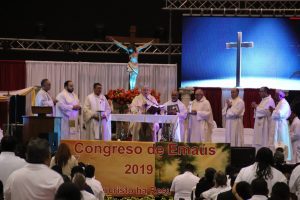 The Bishop specifically credited the Diocesan Spiritual Directors for Hispanic Emmaus, Fathers Jiobani Batista, Luis Pacheco and Luis Albarracin, for their commitment in supporting the Emmaus retreats and for bringing everyone together for the gathering to celebrate the Lord in a special way.
The Bishop specifically credited the Diocesan Spiritual Directors for Hispanic Emmaus, Fathers Jiobani Batista, Luis Pacheco and Luis Albarracin, for their commitment in supporting the Emmaus retreats and for bringing everyone together for the gathering to celebrate the Lord in a special way.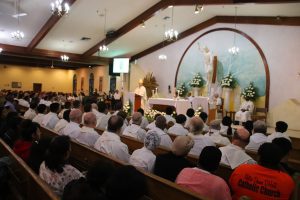 A driving rain storm did little to quell the enthusiasm of the faithful at Our Lady of Guadalupe Parish in Immokalee when they welcomed more than 40 Missionaries of St. Charles (Scalabrinians) who were visiting the parish for the Mass as part of a week-long Provincial Assembly in Boca Raton.
A driving rain storm did little to quell the enthusiasm of the faithful at Our Lady of Guadalupe Parish in Immokalee when they welcomed more than 40 Missionaries of St. Charles (Scalabrinians) who were visiting the parish for the Mass as part of a week-long Provincial Assembly in Boca Raton.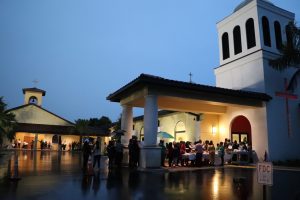 The assembly side-trip to Immokalee for the priests was planned to thank the community for their support of the religious order through the years and to see the progress on the construction of the new Our Lady of Guadalupe Parish Church which is nearing completion adjacent to the existing church.
The assembly side-trip to Immokalee for the priests was planned to thank the community for their support of the religious order through the years and to see the progress on the construction of the new Our Lady of Guadalupe Parish Church which is nearing completion adjacent to the existing church.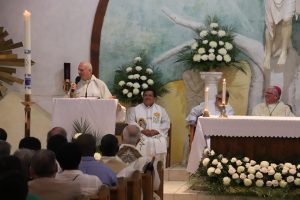 Bishop Dewane expressed his humble and heartfelt gratitude for the years the Missionaries of St. Charles have been in the Diocese, serving the faithful here and continuing to reach out to other missions that were founded.
Bishop Dewane expressed his humble and heartfelt gratitude for the years the Missionaries of St. Charles have been in the Diocese, serving the faithful here and continuing to reach out to other missions that were founded.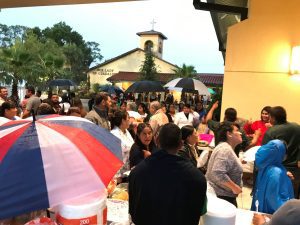 Provincial Father Balen thanked Bishop Dewane for his ongoing support of the Scalabrinian priests who continue to serve in Immokalee. He also thanked the faithful of the parish for their enthusiasm for the visit, noting that the group was expecting a quiet time for Mass and some reflection but instead they were welcomed with joyous open arms that reflect the love of Christ that permeates throughout the parish.
Provincial Father Balen thanked Bishop Dewane for his ongoing support of the Scalabrinian priests who continue to serve in Immokalee. He also thanked the faithful of the parish for their enthusiasm for the visit, noting that the group was expecting a quiet time for Mass and some reflection but instead they were welcomed with joyous open arms that reflect the love of Christ that permeates throughout the parish.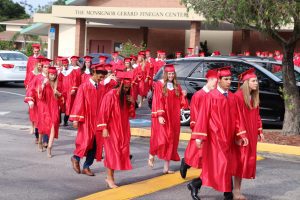 Congratulations to Cardinal Mooney Catholic High School Class of 2019. They are now high school graduates who leave their time with a Diocesan Catholic education that has prepared them well for their journey into adulthood.
Congratulations to Cardinal Mooney Catholic High School Class of 2019. They are now high school graduates who leave their time with a Diocesan Catholic education that has prepared them well for their journey into adulthood.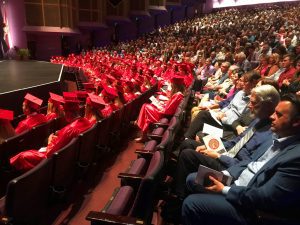 The Commencement Address was given by Dr. Janina Morusiewicz Krajewski, Mooney Class of 1994, who owns a veterinary hospital in Palmetto.
The Commencement Address was given by Dr. Janina Morusiewicz Krajewski, Mooney Class of 1994, who owns a veterinary hospital in Palmetto.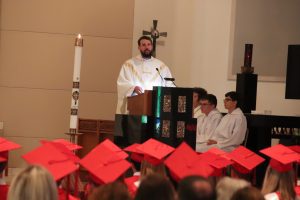 Father Scanlan also encouraged the graduate to believe as they go forward that Christ will do everything He can to deliver them to fulfillment and true happiness. “To do this, you need to stay close to Him. Stay close to Him in the years to come. All he wants is you; your heart, and whatever comes, if you are with Him – all will be well.”
Father Scanlan also encouraged the graduate to believe as they go forward that Christ will do everything He can to deliver them to fulfillment and true happiness. “To do this, you need to stay close to Him. Stay close to Him in the years to come. All he wants is you; your heart, and whatever comes, if you are with Him – all will be well.”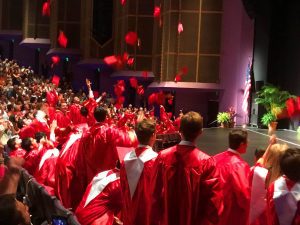 Childs is still recovering from his injuries and was in a wheelchair on stage during the ceremony. After each of the other students were presented their diplomas, Assistant Principal Stefan Gates called out his name. With the aid of crutches, he walked across the stage to a standing ovation to receive his high school diploma.
Childs is still recovering from his injuries and was in a wheelchair on stage during the ceremony. After each of the other students were presented their diplomas, Assistant Principal Stefan Gates called out his name. With the aid of crutches, he walked across the stage to a standing ovation to receive his high school diploma.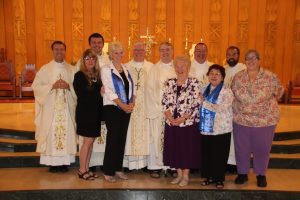 These women are represented by the Venice Diocese Council of Catholic Women (VDCCW) serving as an example of a heartfelt commitment to serve the Church while dedicating themselves to being open to the Holy Spirit.
These women are represented by the Venice Diocese Council of Catholic Women (VDCCW) serving as an example of a heartfelt commitment to serve the Church while dedicating themselves to being open to the Holy Spirit.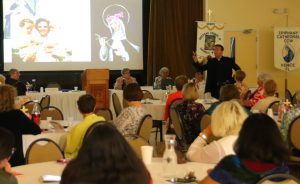 VDCCW acts through its membership to support, empower, and educate all Catholic women in spirituality, leadership and service. Council programs exude Gospel values and serve the needs of the Church and society in the modern world. To exemplify this, the VDCCW is a strong supporter of the Diocesan seminarians and again presented a check to Bishop Dewane for the Diocesan Seminarian Fund.
VDCCW acts through its membership to support, empower, and educate all Catholic women in spirituality, leadership and service. Council programs exude Gospel values and serve the needs of the Church and society in the modern world. To exemplify this, the VDCCW is a strong supporter of the Diocesan seminarians and again presented a check to Bishop Dewane for the Diocesan Seminarian Fund.